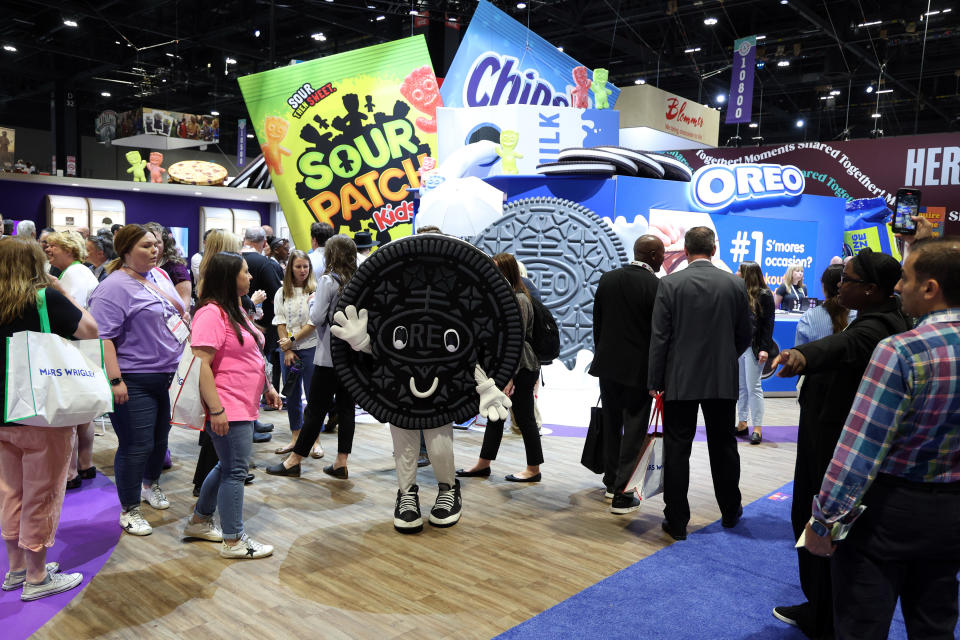Editorial: Chicago’s fragile trade-show business stands to lose if the Democratic National Convention turns ugly.

Flanked by displays of lollipops and beef jerky, the Republican governor of Indiana delivered a message for Chicago: Indianapolis is prepared to compete with it for trade-show business.
Indiana has low costs and a friendly regulatory environment, Gov. Eric Holcomb told a crowd on May 14 at the Sweets & Snacks Expo, a huge food industry convention formerly held at McCormick Place in Chicago that moved to Indy this year. Indiana works together harmoniously with businesses, the lifelong Hoosier said. Indiana pours a fortune into large-scale economic development projects that benefit employers.
To state the obvious, Indianapolis is not Chicago, not even when the Indy 500 is in town. The much bigger city on the lake has a lot going for it that sleepy, landlocked Indy never will. But no one who cares about Chicago’s economic prospects should dismiss Holcomb’s point: Illinois’ convention business practically shut down during the pandemic. Today, this important economic engine is up for grabs and competitors are angling to take it away. And we are not just talking about the perennially competitive Orlando or Las Vegas. Some of Chicago’s competitors are as close as Rosemont, which snagged the Chicago Boat Show this past winter after 92 years in its namesake city.
As trade show operators stage comebacks in the post-COVID-19 era, they’re naturally reconsidering locations. Chicago is still viewed as a premier convention spot, and it can point to some recent successes. Those include re-upping the big Radiological Society of North America show at McCormick Place through 2032 and winning back the Microsoft Ignite information-technology conference, which will return to Chicago after nine years elsewhere.
But the future remains unsettled, and the biggest convention event of this year actually has more downside risk for Chicago business than any potential upside.
The Democratic National Convention in August is being billed as an opportunity to showcase the city’s grandeur and make people want to visit. An estimated 15,000 media representatives will attend. Much has been made of the potential for ugly protests, especially over President Joe Biden’s dithering Gaza policy.
As this page noted May 12, Democrats aren’t coming to promote the city, but rather to ensure Biden’s reelection. They’re justifiably worried about whether progressive Chicago Mayor Brandon Johnson, after a rocky first year in office, can be counted on to protect the convention from disruptions that would alienate swing voters.
For Chicago’s business community, at best, hosting the Democrats won’t hurt. At worst, look out below.
Like Vegas, Orlando and New York, Chicago doesn’t have to prove that it can host a big trade show. Conventioneers are well aware of its advantages, from great hotels and restaurants to a giant airport with many easy-to-reach destinations.
Unlike Chicago, (but much like Indy) Milwaukee needs to put itself on the map as a destination for big-league business events. Hosting the Republican National Convention in mid-July could be a big help. Cleveland, another medium-sized Midwestern city, got a significant boost as a commercial and tourism destination when it successfully hosted the RNC eight years ago.
More important for Chicago is slaying the dragons that still discourage conventioneers and other visitors. A city perceived as high crime, high cost and more concerned with pleasing union bosses than trade-show organizers must improve its reputation. For that, even a smooth-running DNC confab can only help on the margins, and it sure can damage the city’s reputation if it goes off the rails, as it did so infamously in 1968.
Chicago has long been the candy capital of America, and, for years, hosted what’s now the Sweets & Snacks Expo. That changed during the pandemic, when show organizers staged a scaled-down version of the event in Indy, which had looser rules about social distancing.
As the pandemic eased, scheduling constraints at McCormick Place made it difficult for the popular show to expand its floor space during the dates it wanted. Indy beckoned with 250,000 square feet, and show organizers signed a nine-year deal for Indy every two years, followed by a year in Vegas, then back to Indy and so on, in rotation.
The show, which attracts some 16,000 attendees visiting around 1,000 exhibitors, still has a lot of connections with Chicago. Some of those manning the booths of classic local brands such as Garrett’s Popcorn and Blommer’s Chocolate were generally positive about the change in venue.
Greg Guidotti of Chicago’s Ferrara Candy Co., who helped organize this year’s show, praised the outreach from Indianapolis’ economic development team. In Chicago, Sweets & Snacks was crowded out by other, bigger events, most notably the National Restaurant Association show, also regularly held at McCormick Place in the spring.
In Indy, people such as Gov. Holcomb made a medium-sized trade show feel special. “It is this element of being the big event, being the focus,” Guidotti explained. “It’s an opportunity to ‘own’ the city.” In return for its welcome, Indy is getting, and Chicago is losing, some $12 million in city coffers.
In Chicago, the Democrats will indeed “own” the city from Aug. 19 through Aug. 22. And if something goes wrong, don’t be surprised when it’s not only the Orlandos and New Yorks that move in to take advantage, but the Indys, Milwaukees and Clevelands as well.
Submit a letter, of no more than 400 words, to the editor here or email letters@chicagotribune.com.

 Yahoo Finance
Yahoo Finance 